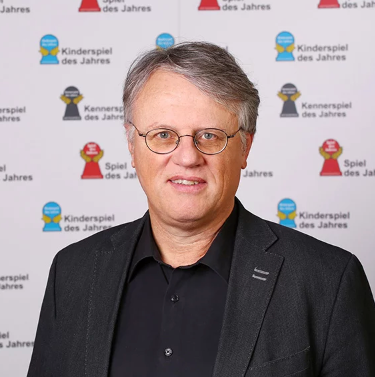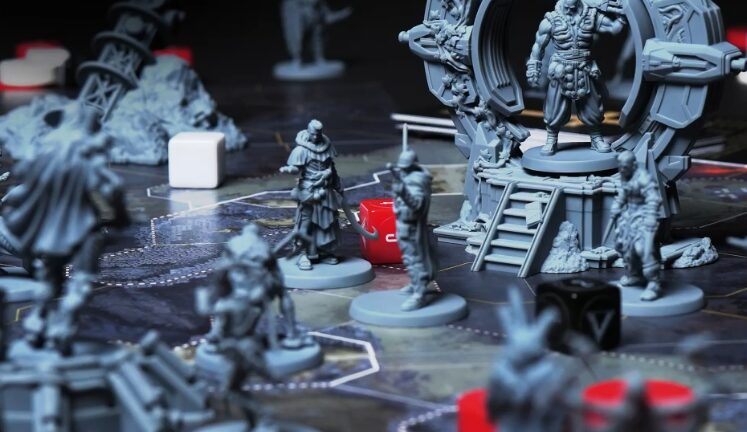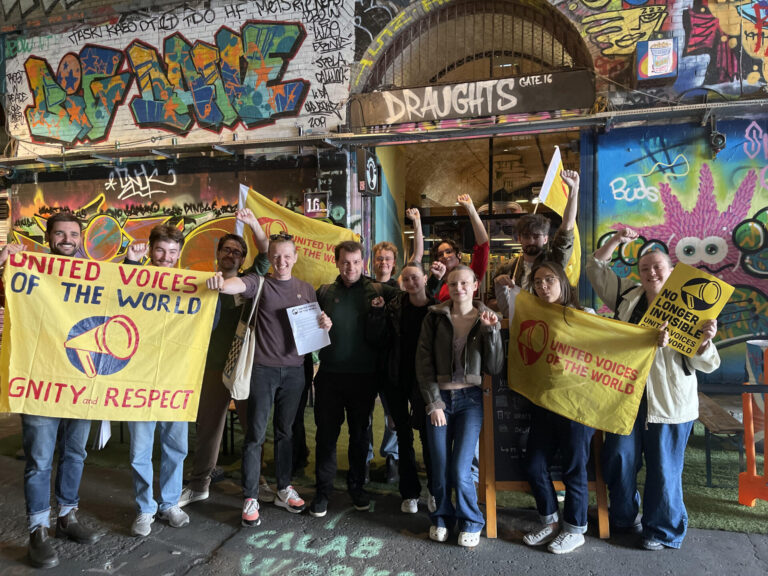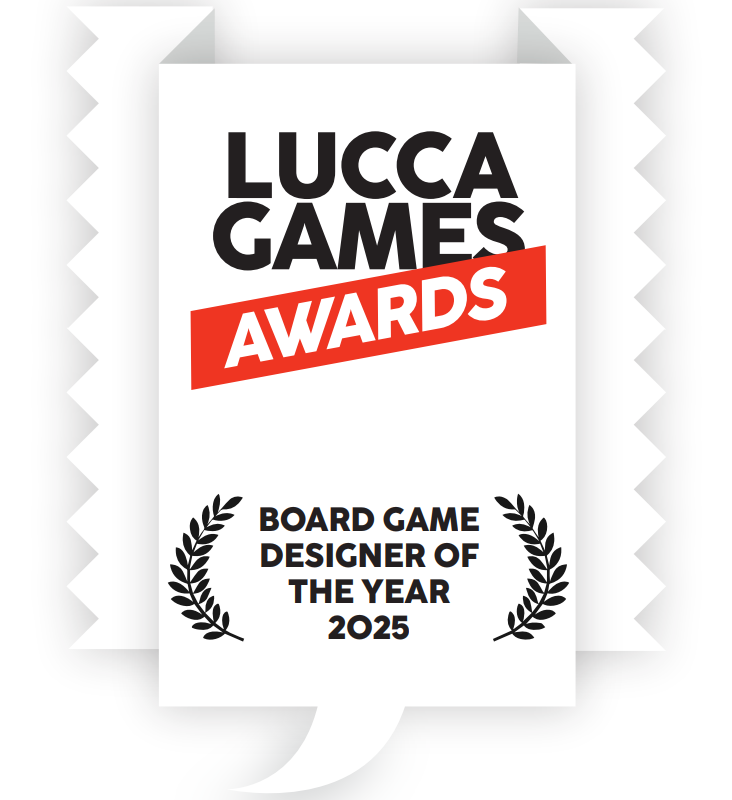
Spiel des Jahres bans Daybreak co-designer Matteo Menapace for wearing pro-Palestine watermelon sticker at 2024 awards
Updated 26/7/24 to include Matteo Menapace’s statement in response to the ban
The organisers of the Spiel des Jahres – widely considered the biggest award in board gaming – have banned one of this year’s prize-winning designers from future events after he wore a watermelon sticker to show his support of Palestine at the award ceremony.
Matteo Menapace was awarded this year’s Kennerspiel des Jahres prize for more complex games on Sunday alongside co-designer Matt Leacock, for their work on climate action-focused game Daybreak – known in Germany as e-mission.
But his decision to wear a watermelon sticker, in the shape of Palestine before it was partitioned to create the state of Israel in the late 1940s, has led to a ban by the Spiel des Jahres association, which said the symbol denies the existence of the Jewish state.

A statement from Spiel des Jahres chairman Harald Schrapers, translated from German, said, “The Spiel des Jahres association has been supporting the ‘Playing for Tolerance’ initiative for years and is thus positioning itself unequivocally against any form of racism and anti-Semitism.
“We find it intolerable that a game author we invited wore a symbol on his clothing on stage that Jews must perceive as anti-Semitic. With his action, the author also behaved in an extremely uncollegial manner towards the others involved in his game (author, editorial team, publisher).”
The statement said Menapace had “exceeded the limits of what must be accepted as a legitimate political expression of opinion”, adding that the “relatively small sticker” attached to his t-shirt did not attract the attention of organisers until after he was already on stage collecting the Kennerspiel award.
It said that immediately after the event Schrapers and Spiel des Jahres deputy chairman Christoph Schlewinski asked Menapace to hand over the sticker, and prohibited him from showing the symbol in the hall and in subsequent photographs.
It added, “Matteo Menapace is no longer welcome at future events organized by the Spiel des Jahres association.”
Menapace provided BoardGameWire with a statement on July 26 which said, “My decision to wear a watermelon sticker on the Spiel des Jahres (SdJ) stage on Sunday was to show solidarity with Palestinian civilians.
“The watermelon is a symbol of Palestinian resilience in the face of decades of oppression. I bought the sticker from Wear The Peace, an organisation that donates 100% of their profits to humanitarian aid.
“I acknowledge the current and historical context that has led to SdJ as a German institution to respond with heightened sensitivity to allegations of antisemitism. I take those allegations very seriously.
“However, debating the shape of the sticker and pushing for an antisemitic interpretation is a distraction. Instead, I want to draw attention to the reality of thousands of Palestinian people who are being wiped off the map, and are in dire need of humanitarian and medical services.
“No human being or group of people should be erased because of their ethnicity, religion or nationality. I hope we can all agree on that.
“All humans deserve peace and justice. I believe this won’t be possible until the end of what the International Court of Justice has recently defined as unlawful occupation. What we can do as citizens of Western nations is to put pressure on our governments to take responsibility for their historical role in this injustice, and end our complicity with their funding and enabling of war crimes.
“These actions and views are entirely my own, and do not necessarily reflect those of anyone else involved with Daybreak / e-Mission.”
A statement from Schmidt Spiele, the publisher of Daybreak in Germany, posted to social media and translated from German said, “Matteo Menapace is an independent game designer and is therefore not on the publisher’s side. Accordingly, there will be no further statement from Schmidt Spiele in this regard.”

Menapace also has watermelon emojis after his name on his Twitter and LinkedIn profiles. The watermelon has seen widespread use by supporters of Palestine since the start of the Israel-Hamas war last year, as it features the same colours as the Palestinian flag.
Several weeks ago Menapace raised more than £700 to provide medical aid for Palestinians injured in the ongoing war by walking 70km, the length of the Gaza strip, over a month-long period.
He said on the fundraising page, “May 15 marks the 76th year since the Nakba (“catastrophe” in Arabic), when at least 750,000 Palestinians were expelled from their homes in historic Palestine, during violent events following the creation of the state of Israel.
“Many who chose not to leave were killed by Zionist militias, who combined to form what we know today as the Israeli Defence Forces (IDF). 76 years of military occupation, apartheid, displacement, dispossession and marginalisation, leading to what is now the most well-documented, live-streamed genocide, with no end in sight.”
Menapace’s ban has provoked condemnation on social media, aimed variously at his own decision to wear the sticker, and separately at the Spiel des Jahres’ committee’s actions.
German board game designer Peer Sylvester, the creator of games including The King is Dead and Brian Boru: High King of Ireland, told BoardGameWire Germany’s history often makes people in the country “very sensitive” towards potential cases of anti-Semitism.
He added that the watermelon symbol is widely read in Germany – although not by him – as a call for the dissolution of the state of Israel, rather than simply a call for support of Palestinian people.
Sylvester said, “Most of my [social media] timeline is now divided. The first impulse of most [German board game] media people was an outcry about the supposingly anti-Semitic pin, while the American side is outraged because of the ‘free speech violation’. I think its hard to overstate how common the conception of the first interpretation is here.
“Germany is very sensitive towards anti-Semitism that makes it difficult to have nuanced debate, as people often regard the extremist reading of the symbols as true.
“I had some people who are absolutely convinced that this is the only possible reading of the matter. So the first impulse here is to clarify that people are against anti-Semitism. Some board game people here have erased their content – reviews, etc – about Daybreak because of the alleged negation of Israel’s right to exist. And of course some people here use this as an excuse to attack the jury, e.g. ‘How can they have let this happen’ – people who have beef with the jury.
“The political climate [in Germany] is very sensitive on this issues, with a big hesitance to criticise Israel in any way, for fear of being misunderstood. That’s why this conflict has led to extra sensitivity.
“I’m a teacher and we had orders to absolutely ban certain slogans and logos, and one head of a university has been asked to leave because she supposingly liked pro-Palestine tweets that can be read as anti-Semitic.
“But also, yes, people wanting to be on the right side here as well – just the other right side in comparision the US – and overbidding themselves with demands and outrage.”







[…] acordo com uma matéria sobre este assunto da BoardGameWire (veja aqui), o autor alemão Peer Sylvester citou a eles que após o ocorrido, alguns influenciadores apagaram […]
How the heck is this not big news?!
And why the heck do you write “israel/hamas war” ?! Repeat after me: it’s ge-no-cide against the palestinian civilians following a 70 year occupation war triggered by israel !
Disgusting! All my support goes to Matteo Menapace ! And down with genociders!
good
[…] Seite boardgamewire zitierte den deutschen Spieleautor Peer Sylvester. Er sagt: „Der größte Teil meiner [Social […]
[…] (Game of the Year) in Germany, probably the world’s most prestigious table game award. Matteo Menapace subsequently had the award stripped and a ban from Spiel des Jahres for wearing a Palestine pin. Draw your own […]
[…] Two days after last years awards the organisers of the Spiel des Jahres banned Menapace from future events after he wore a watermelon sticker to show his support of Palesti…. […]